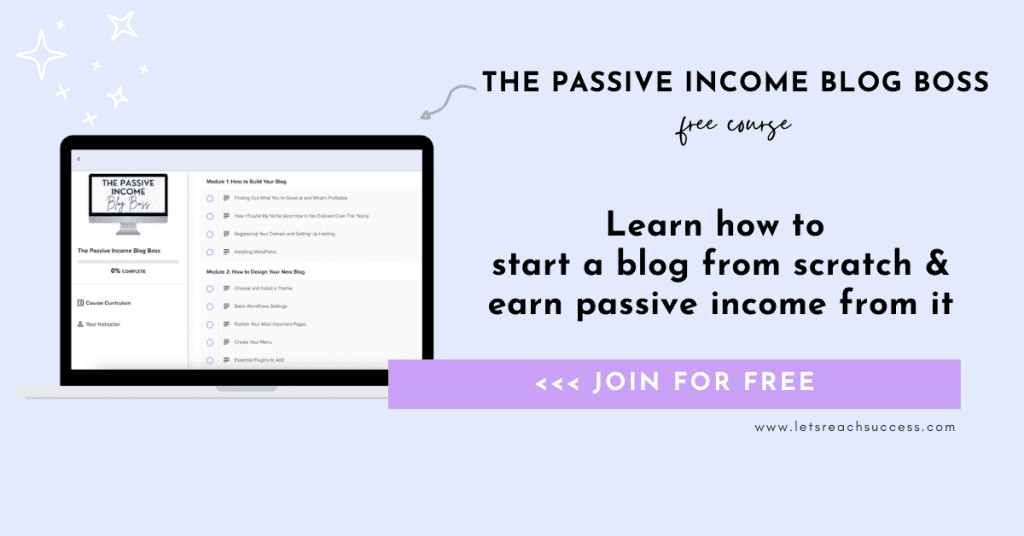Are you hobby blogging, or are you treating blogging like a business and actually doing it professionally?
There are big differences between the two, and in this article, I’m going to outline them. Let’s start with the definitions.
The Definitions
Hobby blogging is the act of blogging on any platform (it doesn’t need to be a self-hosted one) with the goal of sharing your written work or just using it as a creative outlet. It might earn you some money, but it can’t support you financially and it’s not your main project.
Professional blogging, on the other hand, is all about having a blog that you post content on consistently and strategically around a specific theme (or a few), and you have clearly defined systems in place to bring traffic to it and earn revenue from the content.
There’s also an email list and different income streams involved (ads, affiliate marketing, sponsored blogging, etc.)
A hobby blogger might be doing this just for fun, and doesn’t have a plan or monetization strategy in mind. While a pro blogger is intentional. They plan the content, optimize it, promote it, build their online presence, know their audience, do research, follow the trends in the industry, learn from others, collaborate, etc. All with the goal of growing the blogging business, creating impact and doing what they love.
Luckily, you can go from hobby to business. I started Let’s Reach Success as a hobby back in 2013 and had no idea how to monetize.
I learned it over the next years, and through trial and error, managed to turn it into the foundation of my business and become a full-time blogger. Now I teach others how to do the same.
Let’s see more differences between bloggers who do it for fun, and those who run an actual business.

Traits of a Hobby Blogger
Hobby bloggers keep it casual. They post irregularly, there’s no blogging schedule they follow. They don’t really know their audience because they don’t do research, and so they usually create the content they feel like, not the content their audience needs or which is in demand and can get traffic.
They also mostly cover personal topics, or can mix any topic they feel like to the point where you don’t know what the blog is about.
Hobby bloggers don’t care about page views and that takes the pressure away, so they can just blog for fun, express themselves and share updates from their life online.
There’s no strategy, but there’s passion. You get to write about your ideas, your interests and what’s currently happening in your life, reflect on it, and maybe even connect with others who find your posts.
A personal blog could be about sobriety, your dog, your garden, personal growth, book reviews, documenting your days, or just ranting about politics or any other topic that the world is engaged with right now.
The good thing about hobby blogs is that they are unfiltered and 100% from the heart. it’s not about the money and the blogger is being real.
If you can start like this but then turn that into a business, that would be great.
Specifics of a Professional Blog
If you’re blogging professionally, your blog is your business.
It’s not just a blog. It’s a website, a brand, a content platform, a revenue stream.
As the founder, you’re constantly thinking about your content strategy, email marketing, traffic growth, and – of course – revenue.
You can still absolutely love what you do and be passionate about the niche you’ve chosen, but you’re just strategic about it, invest many hours into the blog weekly or daily, and are looking for ways to grow the traffic and revenue.
You do all you can to rank on Google, grow your email list, work with brands, diversify your income, etc.
All this takes time, a lot of research, many decisions, and pivoting when necessary. You also use professional tools (often, paid ones) and have actual business expenses.
You’ve likely registered your business and are paying taxes, so growing the revenue is your top priority.
You’re also intentional with your content. You aim to help people as much as you can and get discovered online, but also convert readers into subscribers, form relationships with them, and make them come back for more.
Needless to say, you aren’t blogging on a hosted platform like wordpress.com, but actually own your website (a self-hosted blog on wordpress.org is an example of that).
That means you log into your dashboard, have designed your site professionally, have connected it to Google Analytics and other tools, track its metrics, publish and distribute your content, and make sure your site loads fast, looks great on mobile and every design element on it is strategic.
You still have some of the traits and goals of hobby bloggers – expression, being spontaneous, covering topics you’re passionate about, getting creative with your content format, wanting to inspire others, etc.
But at the same time, you have big goals and a vision. You track metrics and take action weekly to increase them.
Your email list is your biggest asset, and you always have a plan on how to grow the income by optimizing an existing revenue stream or creating a new one.
While you don’t need to be tech-savvy, you do need to learn SEO, how to run a self-hosted blog and keep it updated, how to work with every tool your blogging business needs, and how other platforms work (like socials) and the content format that works best on each.
From Hobby Blogging to Professional Blogging
You can go from a hobby blogger to a pro blogger, but be prepared for a few things.
First, it may take more time than you think. That could even be years.
Second, the industry evolves and you need to be flexible and stay up to date.
Third, diversification is key, and that’s both in terms of traffic and income. Don’t rely just on Google or just on Pinterest for blog traffic, invest in both, and even in more platforms.
The same goes for revenue. If one thing is working really well and you become a full-time blogger, you might leave everything else behind. But this one income stream can go down or completely disappear due to algorithm changes, the rise of AI, or anything else. That’s why you need to put your eggs in more than one basket.
Read about the different ways to make money blogging here.
And if you need some inspiration, read all the blogger interviews we have. That will definitely help you build momentum.
If you’re a hobby blogger but already thinking about monetizing, growing an engaged audience, or posting more often, you’re on your way to turning this into a business. Keep going!
We have plenty of resources to help you here on the blog.
Start with my free blogging course, The Passive Income Blog Boss.

